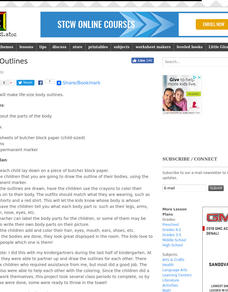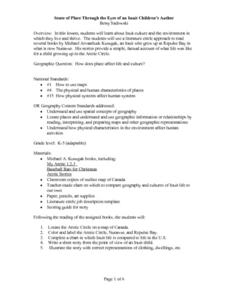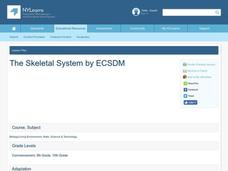Curated OER
Body Parts
In this ESL instructional activity, students draw a picture of a person and label a list of body parts. The list includes ankle, arm, back, chest, ear, elbow, eye, finger.
Curated OER
Parts of a Microscope
In this biology lesson, students label and identify the different parts of a microscope. They complete 16 short answer questions about each part's function and complete 12 review questions in the end.
Curated OER
The Human Mind
Young scholars read and discuss twin studies to explore the debate of nature vs. nurture. They create a list of characteristics and then look for evidence of whether it is primarily a genetic or environmental characteristic. All of the...
Curated OER
Reptiles
In this reptiles worksheet, learners identify and label the different parts of reptiles. They complete 10 short answer questions after reading the information provided in the worksheet.
Curated OER
Review of the Five Senses
Students investigate the five senses. In this human biology lesson, students are given five items and identify which items match best with each of the senses. Students use objects such as a rock, hard candy, and a flower.
Curated OER
Ecosystems Beneath the Surface
Sixth graders create a KWL chart about microorganisms. In this biology lesson, 6th graders create and label a diagram on a microbial mat. They investigate the processes involved in the carbon, oxygen and sulfur cycles.
Curated OER
Body Outlines
Students trace their bodies onto butcherblock paper and then add clothes, hair, eyes, mouths, etc. They use them to identify their body parts.
Curated OER
Water Pollution Lesson Plan: Don't Trust Your Eyes
Students develop a list of actions they could perform that would protect our water resources from pollution. They formulate hypotheses, conduct experiments and draw conclusions about actual pollutants found in our water supply.
Curated OER
Don't Trust Your Eyes
Students brainstorm a list of possible actions that they could do to protect the water resources from pollution. They create hypotheses and conclusions by completing experiments and observing different pollutants.
Curated OER
Sense of Place Through the Eyes of an Inuit Children's Author
Students read books by Michael Arvaaluck Kusugak to explore life in the Artic Circle. After reading the books, students compare and contrast life in the Artic Circle to life in the United States. They write and illustrate a story about...
Curated OER
Hazardous Products Substitutes
Students investigate toxic substances. In this health lesson, students identify warning labels on common household cleaners and create a "less toxic" cleaning recipe book. Students recite a pledge to try a less toxic substitute at home.
Curated OER
IDENTIFYING PARTS OF THE BODY
Students identify and describe the various parts of the body therefore, practicing English vocabulary, pronunciation, and spelling. They discuss the various body parts, some of the inner organs and also, their functions. Finally,...
Curated OER
Body Parts Vocabulary
Students identify the main parts of the human body. In this human body vocabulary lesson, students trace each other's body outline on butcher paper and label the parts of the body. Students define what each body part does. This lesson is...
Curated OER
Your Dog's Health
Students investigate pet health. In this dog care lesson plan, students develop knowledge on how to care for a dog. Students discuss what is needed to keep a dog happy and healthy. Students label pictures of of a dog's visit to the vet.
Curated OER
Butterfly Life Cycle
Focused little scientists will flitter their arms back and forth across the room with excitement as they learn the life cycle of a butterfly and how living things grow and change over time.
ESL Kid Stuff
Measuring Parts of the Body
"How tall are you?" "Who has the longest arms?" As part of a study of the names of various body parts, language learners use rulers and tapes to measure parts of the body.
Curated OER
Preventing and Treating Disease
In this disease activity, students will review the organs associated with the immune system including their specific functions. This activity has 10 matching, 8 true or false, and 5 short answer questions.
Curated OER
The Skeletal System
Students identify the different parts of the skeletal system. In this biology lesson, students put together a skeleton using an interactive website. They evaluate the accuracy of their own answers.
Curated OER
Germs and the Importance of Washing Your Hands
Students observe what happens when bread is handled by dirty hands. They read and discuss the book "Germs." Students participate in an experiment. Students touch bread with a variation of hands: dirty, washed with soap and water, washed...
Curated OER
Pesticides
Students investigate the uses of pesticides and the pros and cons of their use. In this pesticides lesson, students observe simulations of the three classes of pesticides and the effects or actions each has. Students answer 3 follow up...
Curated OER
Germs and the Importance of Washing Your Hands
Students determine the importance of hand washing through experiments. In this hand washing and germs lesson, students listen to a reading of Germs! Germs! Germs! by Bobbi Katz, and discuss what they learn about germs. They experiment by...
Science Friday
Colorful Chromosomes
Everything is in the genes. Individuals observe 14 different traits of themselves. Using pipe cleaners and beads, the learners create models of a chromosome representing their traits. The class then compares and contrasts everyone's...
Curated OER
Raven Chapter 13 Guided Notes: Patterns of Inheritance
For this short space, it would be impossible to describe the breadth of this seven-page genetics worksheet. Geared toward AP or college biology learners, they explore not only the basic vocabulary and concepts, but also the Law of...
Curated OER
Animal Signs
Students discuss the many different types of animal signs that can be used to identify and track animals. They participate in an hands-on activity in which they examine tracks, trails, homes, territory markings, and even "scat" left by...























